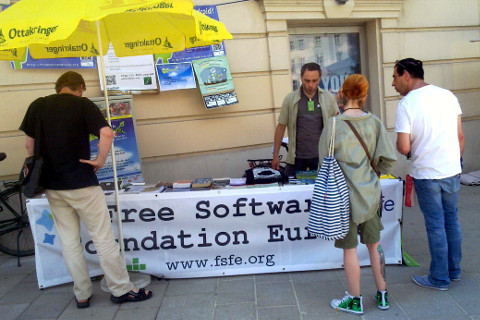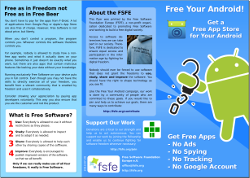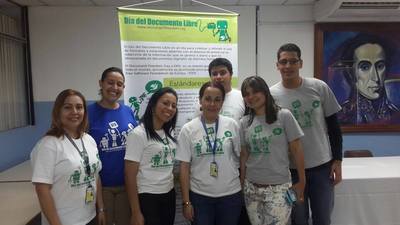FSFE's work in 2015
From teaching people to use encryption for their e-mail, to changing the direction of policy on a European level, the Free Software Foundation Europe worked hard in 2015 to empower users to control technology. With welcome help from our donors and contributors, we set out with ambitious goals for the year. We saw a lot of improvements in how we work, and we ended the year positively with a lot to look forward to in 2016. Please enjoy this story of (some!) of our work over the year, and thank you for helping us make the world a better place!
Free software and FSFE is to me: sharing, learning, being independent of monopolies, producing things together, passion and freedom! Since I've been a Fellow, I am finding new friends who help me in Free Software and other topics, teaching new things every day even though we are kilometres away. It is magnificent to be in a community that continually supports my Free Software passion and motivation!
Nermin Canik
Telling the world about Free Software
We want to help individuals and organisations to understand how Free Software contributes to freedom, transparency, and self-determination. One of the ways to do this is through participation at local and regional events around Europe, often organised or supported by our local Fellows and teams. In 2015, we had booths at many events including FOSDEM (Belgium), T-Dose (Netherlands), FiFFkon (Germany), RMLL/LSM (France), Veganmania (Austria), Euskal Encounter (Spain), 32C3 (Germany), Linuxtage (Austria), Chaos Cologne Conference (Germany), Linuxwochen (Austria), FrOSCon (Germany), DebConf (Germany) and OpenTech Summit (Germany).

The FSFE's Fellowship group in Vienna exhibiting at Veganmania.
Our Fellowship group Rhein/Main also presented Free Software and the FSFE with a booth at an event organised by the Green Party Hesse. Thanks to our local fellows, information about Free Software also reached many at conferences where we did not have any formal presence with a booth. Furthermore we gave talks and presentations at many more conferences and events.
We increased translations of our information materials. Our flyer about Free Software-based encryption technologies was printed in no less than nine different languages (German, Greek, English, Spanish, French, Dutch, Polish, Albanian and Turkish) and was offered for download in a further two (Chinese and Italian). You can help us distribute those leaflets and others by ordering them on our website. Aside from our flyers, our monthly newsletter was also prepared and sent out on average in seven different languages.

One of the flyers we use to spread the word about Free Software.
The fifth I Love Free Software Day was another successful appreciation day, not only for the FSFE, but for Free Software contributors everywhere. Individual Free Software fans from all over the world spread loving messages online through thank-you letters and poems, as well as sharing pictures and collecting donations to support Free Software groups. Organisations like the EFF, the Document Foundation, Wikimedia, Framasoft and the German Green Party participated in this global celebration.

Cryptie expressing her love for Chatsecure during I Love Free Software Day.
Changing the rules
FSFE wants to enhance users' rights by abolishing barriers to Free Software adoption. Following our policy goals for the period of 2014-2019 we are involved in the policy work on both national and the EU level.
In the end of 2014, FSFE provided input to the European Commission's (EC) internal strategy for the use of Free Software. In April 2015, the European Commission published a new version of their "Open Source Strategy" which included several improvements in comparison to its former version. For example, it included a more determined attitude to Free Software and a clearer approach to Open Standards which include promotion of the use of products supporting open technical specifications which can be freely adopted, implemented and extended.
FSFE also replied to the European Commission's public consultation on patents and standards in February 2015, and on public procurement and respect for intellectual property rights in July 2015.

Part of the Document Freedom Day team in Mérida, Venezuela. Licensed under a Creative Commons Attribution-ShareAlike 4.0 License.
In March 2015, as a part of Document Freedom Day 2015, FSFE together with Greens/EFA, organised the seminar presenting the study “Ensuring utmost transparency - Free Software and Open Standards under the Rules of Procedure of the European Parliament”, to reinstate the importance of Free Software and Open Standards for transparency within the EU. The participation in such events is intended to raise awareness amongst EU officials about Free Software and Open Standards and their reliance on proprietary document formats. Awareness of vendor lock-in in the EU institutions is slowly growing, but the concrete steps to overcome this problem are absent. However participation in such events was a good opportunity to reinstate our main position amongst EU officials themselves and who will, in the end, make the relevant decisions.
With several other organisations such as April, EDRi, OFE, and OSB Alliance, we at the same time issued a joint statement to call on the European Commission to ensure all interactions with the public can be performed entirely using Open Standards. This addressed the current alarming situation of EU institutions imposing proprietary software from particular vendors onto citizens in order to effectively communicate with them.
In this light 2015 was also the year when we closed our six-year-long PDFreaders campaign after convincing 1125 public administrations to remove advertisement for proprietary software from their websites. It is one of our the most successful campaigns to date and we are happy to see the public sector moving to the right direction of not forcing visitors of their website to use proprietary sofware. Despite this, more work needs to be conducted in order to bring and uphold the necessary change.
To further strengthen users' rights, together with many other organisations we issued a statement in May 2015 asking the European Commission to put in place safeguards allowing anyone the right to tinker with their own devices. In a similar way, during 2015, we also helped end compulsory routers in Germany with a law which ensures users have the freedom to choose their own Free Software router. This should set an example across Europe, and we support similar legislation wherever needed.

One of the routers worked on as part of our campaign on compulsory routers. Image by Scott Beale / Laughing Squid. Licensed under a Creative Commons Attribution-NonCommercial 2.0 License.
Since May 2015, European policy is heavily focused on the Digital Single Market strategy (DSM) which involves several important political and legislative changes in the areas important to our policy work, in order to ensure "efficiency, trust and security in digital services" in the EU. Our evaluation of the Digital Single Market Strategy for the European Commission was well received and we expect the Commission to follow our recommendations while pursuing the legislative initiatives within DSM.
We also closely followed the own-initiative report of the European Parliament "Towards a digital single market" which was based on the Commission's Digital Single Market strategy. We informed members of the European Parliament about existing problems for Free Software in standardisation, and proposed possible solutions according to our evaluation of the DSM. The final adopted version of the Report included several positive references to Free Software and we were happy to see the Parliament supporting our points to increase the use of Free Software in public sector.
Another important area for Free Software has been the on-going copyright reform in the EU. Throghout 2015, we evaluated the European Parliament's own-iniative report on on the implementation of Directive 2001/29/EC (InfoSoc Directive) both on the draft report and then on the final adopted version. The final version included a few positive improvements for Free Software, e.g. better protection for public domain and explicit protection of private copying against technological measures. We hope in 2016 the European Commission will take Parliament's non-binding recommendations into consideration and use the opportunity to adapt copyright law to the needs of digital environment.
Our Free Software legal work
One of FSFE's biggest networks we facilitate is our legal network, which in 2015 grew to more than 380 members, both legal professionals and technologists with deep knowledge and understanding of free software licensing. The legal network is unique in that it's not built on representation from businesses or organisations, but on individuals and trust between the individuals and our legal team, a format we're actively looking to replicate in other areas, to similarly advance the dialogue and understanding of free software.
Our legal team continued to answer legal enquiries throughout the year, primarily from members of the Free Software community, and organised our network's annual Legal & Licensing Workshop again. In the end of 2015, the special interest group (SIG) focusing on trademarks in Free Software released a A practical guide to understanding trademarks in the context of Free and Open Source Software projects. It's been encouraging for us to see over the year individuals coming into the network and learning about the benefit of copyleft and how both businesses and other organisations work successfully with copyleft and free software in general in their work.
In the beginning of 2015, a part of our work also focused on Bacula, for which the FSFE held rights due to its use of our Fiduciary License Agreement (FLA). FSFE's main interest has been on keeping Bacula Free Software. With this in mind we agreed to conditionally retransfer some of the rights held by FSFE and in a new agreement between Kern Sibbald, Bacula Systems and FSFE, we agreed the Bacula Community edition should continue to be released as Free Software, and the FSFE will have the right to take back the exclusive right to the code in question this should ever change.
FSFE's finances
With an annual budget of now over €400,000 per year, which is close to four times as much as we had the same time ten years ago. The organisation, as well as its financial resources, continue to grow, mostly due to a continuous increase in individual donors and our sustaining members, the Fellows.
Where FSFE's funds come from
In 2015, the FSFE received €441,963 in income. About 40% of this is from Fellowship contributions (up from 35% in 2014) and a further 35% in unrestricted donations (meaning this money isn't connected to any one specific activity we do). 18% of our income came from sponsors of specific activities (the Free Software Legal & Licensing Workshop, and Document Freedom Day) and 7% from sale of merchandise at booths and through our web orders.
The FSFE has a transparency commitment to list our donors which contribute more than 10% of our annual budget. For 2015, our only donor contributing more than this was Google, with a donation representing 14% of the annual income for the organisation.
82% of FSFE's income is unrestricted, while 18% are tied to specific purposes -- mostly the sponsoring mentioned above. The Fellowship contributions continue to be important for our work and we see a gradual shift towards an increase of Fellowship contributions (up by 9% from 2014 to 2015, and an average per donation of 124€ to 126€) which are the bedrock of FSFE's financial independence.
How we spend the money
No matter how you look at the money the organisation spend, the largest amount of it will be staff salaries, including funding for trainees and interns which work for a few months upwards of a year with the FSFE to learn about Free Software and contribute to our work. The FSFE's team of experienced and dedicated staff contribute greatly to the success of the organisation, and also contribute to facilitating the volunteer work hundreds of our Fellows and community members engage in. The total spending in 2015 amounted to €431,216 whereof 63% was spend on personnel costs.
Of the other cost centres, we spent 15% on administration (office costs, internal coordination, technical infrastructure, bank fees, and everything we need to keep the organisation running and fulfilling its legal obligations).
If looking at our policy, public awareness, legal work and merchandise (purchase and shipping), the distribution between them was with 48% of the funding going to legal work, 28% on public awareness, 24% on merchandise and almost no money on policy! The latter is due to most of our costs for working on policy come from staff time, not on travel or materials needing to be produced. It was slightly higher in 2014, but overall, our investment in policy is an investment in staff time.
Regarding staff time, the highest portion of our work time goes to public awareness (32% of working time across the organisation). A further 24% is spent on legal work, 10% on policy work and 3% on merchandise. The remaining 31% is administrative work, which include everything from internal administration and meetings to reading and responding to emails and is the number most difficult to measure, since a large part of what can be seen as administrative (reading and writing emails) can also be seen as supporting one of our other work areas, such as public awareness.
What's ahead in 2016
For 2016, our focus is on pushing our demand for all publicly funded software to be published as Free Software, and for everyone's right to experiment with their own hard- and software. We will also work to provide training for our volunteers and initiate coordination between Free Software groups active on policy issues in the EU. It's an exciting year ahead for Free Software, and we hope that you will join us on the way!
Sincerely,
Jonas Öberg
Executive Director
Matthias Kirschner
President